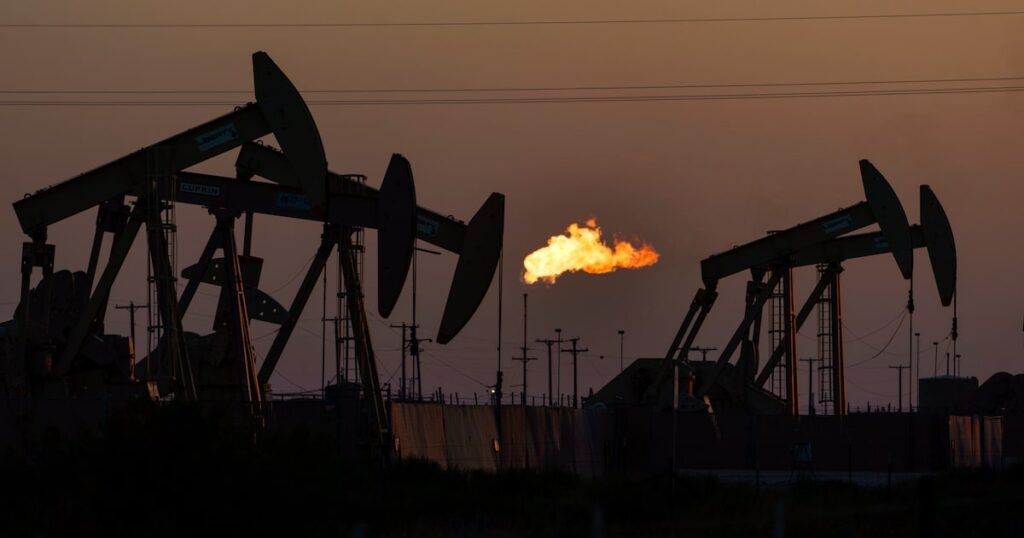Falling crude prices will eventually translate into lower prices at the gas pump for consumers, but that doesn’t mean its all good news ― especially for Texas-based oil producers.
On Monday, global crude prices sank after OPEC+ agreed over the weekend to surge production for a second month, adding to existing concerns about how tariffs may impact worldwide demand. Brent fell to $60 per barrel, while U.S. crude (West Texas Intermediate) slid by 2% to settle around $57 per barrel.
“It definitely magnifies what has already become an uncertain backdrop for oil prices,” Bracewell LLP energy partner Austin Lee said. “The combination of recent trade policies and the previous output increase from OPEC had already shaken things up and this just adds to that.”
Eventually, declining oil prices will lead to lower prices at the pump, with AAA data showing the average price per gallon of gas was $2.74 as of Monday, below the national average of $3.
Yet the longer crude prices remain in freefall, the bigger the headaches for Lone Star State oil producers, who returned a record amount to state and local coffers in 2024, according to the Texas Oil and Gas Association.
Lower gas prices provide little incentive for the sector to pump more crude in the U.S., the world’s largest energy producer.
For the prolific Permian region of West Texas ― which together with southeastern New Mexico cranked out more oil than anywhere else in the U.S last year, according the Energy Information Agency notes ― the average breakeven WTI price to support profitable drilling activities sits above $60 per barrel.
The Federal Reserve Bank of Dallas recently noted that energy executives hiked their breakeven pain threshold to justify more drilling in the face of spiking economic uncertainty; meanwhile, OPEC’s politically-fraught decision pushed down oil prices all over again.
Already, returns on oil and gas equities showed “mixed signals” for the first quarter of the year, and seasonally adjusted refining margins continued to decline year over year, according to the Dallas Fed.
Related:Texas businesses are ‘flashing warning signs’ as tariff wars heat up
‘Pulling assets off the market’
“It is noteworthy that the average break-even oil price among large producers…increased from $58 per barrel in 2024 to $61 in 2025, and these producers are collectively responsible for the large majority of U.S. onshore crude oil production,” the Dallas Fed report noted.
“In contrast, the average break-even price among smaller producers decreased from $68 per barrel to $66, likely due in part to mergers and acquisitions as well as reduced activity among these firms that typically have higher costs.”
Weak prices also put a damper on energy investment activity. Lee said the slide in crude has given potential buyers “some pause” over certain transactions, as they take another look at how they are valuing potential acquisitions.
Henry Benton, a Dallas partner at Troutman Pepper Locke LLP, said the price drop will impact the oil and gas mergers and acquisitions market. Energy-related deals had already cooled in connection with the pricing volatility the last few months.
“Increasingly, companies that planned to sell assets into what had been expected to be an active year for oil & gas M&A in 2025 are pulling their assets off the market and are going to wait for a better pricing environment,” Benton said.
He added that the production side will also feel impacts.
“In terms of what this means from a production standpoint – when you combine this with what had already been a choppy few months economically – I would expect rig count will go down and producers will continue to be very disciplined in how they deploy resources on the production side until oil prices stabilize,” Benton added.
This reporting is part of the Future of North Texas, a community-funded journalism initiative supported by the Commit Partnership, Communities Foundation of Texas, The Dallas Foundation, the Dallas Mavericks, the Dallas Regional Chamber, Deedie Rose, the McCune-Losinger Family Fund, The Meadows Foundation, the Perot Foundation, the United Way of Metropolitan Dallas and the University of Texas at Dallas. The News retains full editorial control of this coverage.


